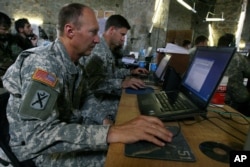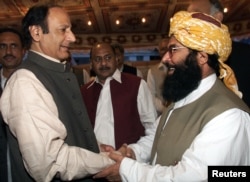Afghan religious leaders on Thursday strongly refuted pro-Taliban remarks by a top Pakistani religious and political leader, classifying them as an "intelligence spin."
In response to recent remarks by Maulana Fazl-ur-Rahman, leader of Pakistani's Jamiat Ulema-e-Islam (JUI-F), a conservative religious party accused of maintaining links with various militant groups, the Islamic Scholars Council of Afghanistan called for an Islamic conference to be held in Kabul to debate the religious legitimacy of the Taliban insurgency in Afghanistan.
"Genuine and pious clerics from Pakistan, along with renowned Islamic scholars from the Muslim world, should convene for a religious debate with Afghan religious scholars to assess the situation in Afghanistan, based on the book of Allah [Quran] and teachings of the Prophet [Muhammad]," the Afghan clerics council said.
The statement added that the Pakistani cleric has attempted to legitimize the "inhumane and heinous" actions of militants who have targeted schools, hospitals and mosques throughout the country in their bloody insurgency, killing tens of thousands of innocent Afghan civilians over the last decade.
U.S., NATO presence cited
The JUI-F leader last week linked the Afghan Taliban's insurgency to the presence of U.S. and NATO forces in Afghanistan, in an effort to justify the Taliban's continued violence in the country.
Rahman said peace in Afghanistan would not be achieved as long as foreign troops were in the country.
"International forces must withdraw from Afghanistan for stability and peace in the region," said Rahman, while speaking at a formal gathering where more than a quarter-million people, including foreign guests, celebrated the 100th anniversary of the establishment of the conservative party.
The JUI-F is an offshoot of a Muslim Sunni clerics' political movement founded in former British India by the Deobandi madrassa, or religious school, in 1919.
Rahman's father, Mufti Mahmoud, was one of the leading members who parted ways with the movement in 1945 and established what was originally known as JUI after the creation of Pakistan in 1947. The party has been an adamant supporter of the Afghan Taliban, a majority of whom have been educated in hundreds of religious seminaries run by the party across Pakistan.
The Islamic Scholars Council of Afghanistan argues that the JUI-F leader lacks the credentials to issue jihadi verdicts (fatwa) legitimizing the insurgency in Afghanistan.
'A hostile stance'
"We do not recognize Fazl-ur-Rahman as a religious scholar, but rather he is closely associated with Pakistan's military establishment," Mohammad Qasem Haleemi, the spokesman for the Islamic Scholars Council of Afghanistan, told VOA's Afghan service last week. "It is a hostile stance against Afghanistan."
Haleemi said that ironically, Fazl-ur-Rahman and his party want peace in Pakistan but instigate people against a legitimate government in Afghanistan.
Last week, the JUI-F secretary general, Abdul Ghafoor Haidari, who was denied a U.S. visa in February, called on the Pakistani Taliban (TTP) to lay down their arms and join his Islamist political party to pursue its objectives through political means.
Analysts charge that several religious groups like JUI-F are actively helping achieve Pakistani military policy goals in the region.
"Pakistan's security establishment would want to combat India's influence in Afghanistan through Afghan Taliban. Maulana Fazl-ur-Rehman and many other politicians support the security establishment and thus keep a different stance for Afghan and Pakistani Taliban," said Khadim Hussain, a political and security analyst in Peshawar.
Pakistani officials deny having used these political parties to lure militant groups to violence in places like Afghanistan and India.






